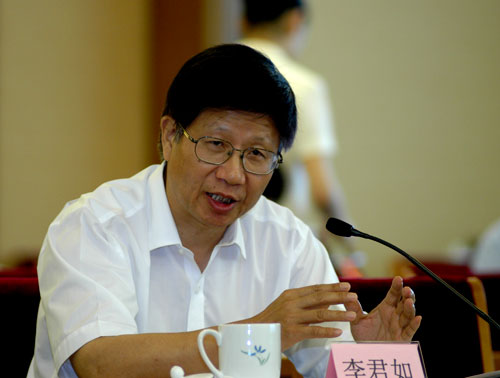Party's positive pragmatism
- By Li Junru
 0 Comment(s)
0 Comment(s) Print
Print E-mail China Daily, December 26, 2012
E-mail China Daily, December 26, 2012
 |
|
Li Junru?is vice-president of the Party School. [File photo] |
The 18th Party Congress in November opened a new chapter in China's reform and opening-up drive that will have wide-ranging effects and a global impact.
The congress came to an end after successfully completing all its scheduled tasks, including passage of a program for China's development in the coming five to 10 years, amendment of the Party Constitution and its enrichment - in particular with the Outlook on Scientific Development as a new guiding ideology - and election of a new Party leadership headed by Xi Jinping.
China's development will be scientific, democratic, civilized, harmonious and peaceful.
What will that bring to the world?
First of all, the congress informed the world that the China engine will continue to move forward at a steady and relatively fast speed, generating even more investment and development opportunities to fuel the growth of other economies.
Since its reform and opening-up China has become the main driver of the global economy. Although the global financial crisis seriously battered the global economy and had a negative impact on the Chinese economy, instead of running out of steam, the Chinese economy has remained on a healthy development track. Although slightly slower than expected, China's GDP grew by 7.7 percent in the first nine months of 2012, and 10.24 million new urban jobs were created. The improvement in the urban employment situation was attributable to the comparatively fast development of the service sector, an indication that efforts to adjust China's economic structure are starting to pay off.
Second, the congress affirmed China will maintain its development strategy of mutual benefit. It will never resort to trade protectionism against other countries, and it will join hands with other countries to promote vigorous, sustainable and balanced development of the global economy.
The subprime mortgage crisis in the United States and the European debt crisis have exposed the global economy to growing instability and uncertainty. Under such circumstances, trade protectionism has gained new ground and trade frictions are on the rise. Yet such shortsighted pursuit of petty gains is detrimental to the elimination of the crises, and may even lead to greater difficulties and new crises. In view of the overall situation, the congress made the explicit declaration that China will strengthen coordination with other major economies on macroeconomic policy and resolve economic and trade frictions through consultation. It will uphold the principle of balancing rights with obligations, take an active part in global economic governance, promote and facilitate free trade and investment, and oppose protectionism in all its forms.
These policies have been designed not merely to serve China's own interests. They are intended to help other countries get out of the financial mire at the earliest possible date. This will surely have a positive effect on efforts to strengthen global governance and overcome the global financial crisis.
Third, the congress also sent the message that China will adhere to the path of peaceful development, will pursue an independent foreign policy of peace, and seek to safeguard world peace and development.
The global situation is complex: terrorism is rampant, and cyber security, energy security, and food security are becoming increasingly and conspicuously problematic. Meanwhile, hegemonism, power politics and neo-interventionism have gained ground, and regional issues and the declaration by the United States that it is "rebalancing" to the Asia-Pacific region have put China under greater pressure. These complexities may explain why the world kept such a close eye on the congress.
For all its exposure to the international climate, China has neither wavered from its principled stand of resolutely safeguarding its national sovereignty, security and development interests, nor given up its basic belief that peace and development are the dominant themes of the time. China has vowed to play a bigger role in international affairs as a responsible major power, and to join hands with rest of the world to meet global challenges.
Based on the general human course of peace and development, these policies will surely have a positive impact on the world.





